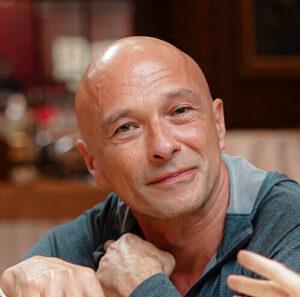Today’s social divisions are as palpable as ever, and on the receiving end are often people from marginalized communities, immigrants and refugees.
As investors, we know many founders who have recently arrived to the U.S. from countries suffering humanitarian crises, or whose teams are stuck in war zones. The challenges they face in everyday life — let alone finding success as an entrepreneur — are unimaginable to many.
VCs have disproportionate power in determining the fate of founders, and in times like these we should be using that power to create a community that’s bigger than a firm, company or capital.
Investors should use their privileged position to create strong communities and accompany isolated and underrepresented entrepreneurs through personal and professional challenges. This is how any VC can create more community for the benefit of founders, and themselves.
Create inclusiveness
Entrepreneurs entering, or considering entering, the startup world are often disillusioned by its exclusiveness.


VCs could be opening doors to those with historically less access to entrepreneurship by setting up an accelerator for marginalized communities, or running a training program with a local college. For example, VC firm Laconia memiliki Venture Cooperative aimed at increasing access to the investing community, and thus entrepreneurship.
At Usaha Satu Arah, we also started a kolektif of successful entrepreneurs to support immigrant early-stage founders, who often face unique barriers to fundraising.
All you need is a willing community of people ready to offer their unique expertise and support for a larger goal. You don’t need to spend obscene amounts of money, just share knowledge and introductions with those who could most benefit.
Put your machinery to work for others
VCs should favor a partnership mindset where resources can be shared within their ecosystem and portfolio. This can offer significant accompaniment to entrepreneurs who come from an unfamiliar environment.
VCs have an array of services at their disposal that can easily be deployed to service startups. If your firm uses PR services, you can negotiate a deal with your agency to spend some of their time with your portfolio to increase their media-savviness and reach.
Other VCs are launching free products for startups to support the community with more accessible growth services. We’ve also been sharing the services of our graphic design agency with our portfolio — with the added benefit that the agency has a team in Ukraine.
Unite experts with shared experiences
Another step VCs can take is to unite people within a structured community — whether that’s a collective, community, safe space or association. Reach out to successful entrepreneurs, academics, stakeholders and other VCs who share your values and have something new to offer founders.
You should be looking to recruit people who reflect the experience and identity of the founders you’re trying to support, while also having a track record of success. For entrepreneurs, being able to lean on a group of people who are not expecting anything in return, and whose interest in you is purely to help from a place of shared hardship or ambition, can instill founders with a sense of optimism. We’ve found that it’s also rewarding for participants themselves. This is why you can’t create a collective based on quid pro quo, but rather on the very desire for community.
These initiatives may take time, but ideally they will grow organically. Of course, it would be naive to think that none of this community-building comes back in your favor, but this should be a bonus to the more widespread potential of your actions.
Semyon Dukach adalah mitra pendiri Usaha Satu Arah, sebuah perusahaan VC yang mendanai para pendiri imigran yang luar biasa. Ia adalah warga Ukraina-Amerika yang datang ke AS sebagai pengungsi anak pada tahun 1979. Ia adalah mantan direktur pelaksana Techstars (Boston), dan angel investor di lebih dari 100 perusahaan.
Ilustrasi: Dom Guzman


Tetap up to date dengan putaran pendanaan terbaru, akuisisi, dan banyak lagi dengan
Crunchbase Harian.
Collaborative Robotics yang berbasis di Santa Clara, California menjadi startup robotika terbaru yang mengumpulkan pendapatan sebesar sembilan digit, menghasilkan $100 juta…
Ketekunan berkualitas tinggi telah kembali, dan ini adalah seni sekaligus sains, tulis kolumnis tamu Nicolas Sauvage, yang menawarkan pandangan dari kedua sisi…
Pembeli makanan saat ini sudah cukup familiar dengan makanan tradisional yang terbuat dari bahan-bahan nontradisional, dan dilihat dari jajaran makanan yang didanai…
Startup keamanan data Cyera mengumpulkan Seri C senilai $300 juta yang dipimpin oleh Coatue dengan penilaian $1.4 miliar.
- Konten Bertenaga SEO & Distribusi PR. Dapatkan Amplifikasi Hari Ini.
- PlatoData.Jaringan Vertikal Generatif Ai. Berdayakan Diri Anda. Akses Di Sini.
- PlatoAiStream. Intelijen Web3. Pengetahuan Diperkuat. Akses Di Sini.
- PlatoESG. Karbon, teknologi bersih, energi, Lingkungan Hidup, Tenaga surya, Penanganan limbah. Akses Di Sini.
- PlatoHealth. Kecerdasan Uji Coba Biotek dan Klinis. Akses Di Sini.
- Sumber: https://news.crunchbase.com/venture/creating-community-immigrant-founders-dukach-one-way/
- :memiliki
- :adalah
- :bukan
- :Di mana
- $ 100 juta
- $NAIK
- 100
- 300
- 4
- a
- Sanggup
- akademisi
- akselerator
- mengakses
- dapat diakses
- menemani
- akuisisi
- tindakan
- menambahkan
- badan
- ditujukan
- sendirian
- juga
- ambisi
- jumlah
- an
- dan
- menyengat
- Malaikat Investor
- Apa pun
- apa saja
- ADALAH
- susunan
- tiba
- Seni
- AS
- Asosiasi
- At
- kembali
- hambatan
- berdasarkan
- BE
- menjadi
- menjadi
- makhluk
- manfaat
- lebih besar
- Milyar
- bonus
- boston
- kedua
- Kedua sisi
- tapi
- by
- datang
- CAN
- modal
- tantangan
- anak
- Clara
- Coatue
- kolaboratif
- Kolektif
- Perguruan tinggi
- bagaimana
- datang
- Masyarakat
- masyarakat
- Perusahaan
- perusahaan
- mengingat
- bisa
- negara
- Tentu saja
- membuat
- krisis
- CrunchBase
- harian
- Tanggal
- transaksi
- dikerahkan
- Mendesain
- keinginan
- menentukan
- ketekunan
- Kepala
- pembuangan
- disproporsional
- Divisi
- Dont
- pintu
- tahap awal
- mudah
- ekosistem
- akhir
- memasuki
- Pengusaha
- pengusaha
- kewiraswastaan
- Lingkungan Hidup
- Eter (ETH)
- pERNAH
- sehari-hari
- contoh
- luar biasa
- mengharapkan
- pengalaman
- keahlian
- ahli
- Menghadapi
- akrab
- nasib
- mendukung
- temuan
- Perusahaan
- makanan
- makanan
- Untuk
- Untuk Startups
- Bekas
- ditemukan
- pendiri
- pembinaan
- Gratis
- dari
- yg disimpan
- pendanaan
- putaran pendanaan
- Penggalangan Dana
- tujuan
- grafis
- Kelompok
- Tumbuh
- Pertumbuhan
- Tamu
- kesulitan
- Memiliki
- memiliki
- he
- membantu
- secara historis
- Seterpercayaapakah Olymp Trade? Kesimpulan
- HTTPS
- Kemanusiaan
- idealnya
- identitas
- if
- Imigran
- in
- Meningkatkan
- meningkatkan
- bahan
- inisiatif
- menanamkan
- bunga
- perkenalan
- investasi
- investor
- Investor
- terpencil
- IT
- NYA
- jpg
- hanya
- Tahu
- pengetahuan
- lebih besar
- Terbaru
- bersandar
- Dipimpin
- kurang
- membiarkan
- Hidup
- 'like'
- lokal
- mengunci
- melihat
- mencari
- mesin-mesin
- terbuat
- pelaksana
- Managing Director
- banyak
- terpinggirkan
- besar-besaran
- max-width
- Mungkin..
- juta
- Mindset
- uang
- lebih
- paling
- naif
- Perlu
- New
- Nicolas
- None
- tidak tradisional
- of
- menawarkan
- Penawaran
- sering
- on
- ONE
- pembukaan
- Optimisme
- or
- secara organik
- Lainnya
- kami
- di luar
- lebih
- jelas
- peserta
- pasangan
- Kemitraan
- Konsultan Ahli
- pribadi
- Tempat
- plato
- Kecerdasan Data Plato
- Data Plato
- portofolio
- posisi
- potensi
- kekuasaan
- pr
- istimewa
- per
- profesional
- program
- murni
- agak
- menaikkan
- menonjol
- jajaran
- agak
- mencapai
- siap
- menerima
- baru
- Pendanaan Terbaru
- baru-baru ini
- catatan
- rekrut
- mencerminkan
- pengungsi
- pengungsi
- Sumber
- kembali
- bermanfaat
- robotika
- bulat
- putaran
- berjalan
- s
- aman
- Ilmu
- keamanan
- startup keamanan
- rasa
- Seri
- Seri C
- layanan
- Layanan
- pengaturan
- Share
- berbagi
- berbagi
- Pembeli
- harus
- Sisi
- penting
- Sosial
- beberapa
- sesuatu
- Space
- menghabiskan
- stakeholder
- mulai
- startup
- Startups
- tinggal
- Langkah
- kuat
- tersusun
- terjebak
- sukses
- sukses
- penderitaan
- mendukung
- Mengambil
- tim
- tim
- dari
- bahwa
- Grafik
- mereka
- diri
- Ini
- mereka
- Berpikir
- ini
- itu
- Melalui
- Demikian
- waktu
- kali
- untuk
- hari ini
- jalur
- rekam jejak
- tradisional
- Pelatihan
- mencoba
- kami
- Ukraina
- kurang terwakili
- tidak biasa
- tak terbayangkan
- unik
- bersatu
- menggunakan
- kegunaan
- menggunakan
- Penilaian
- Nilai - Nilai
- VC
- VCs
- Ventures
- sangat
- perang
- Cara..
- we
- apakah
- sementara
- SIAPA
- yang
- mengapa
- tersebar luas
- akan
- rela
- dengan
- dalam
- Kerja
- dunia
- akan
- kamu
- Anda
- zephyrnet.dll
- zona












